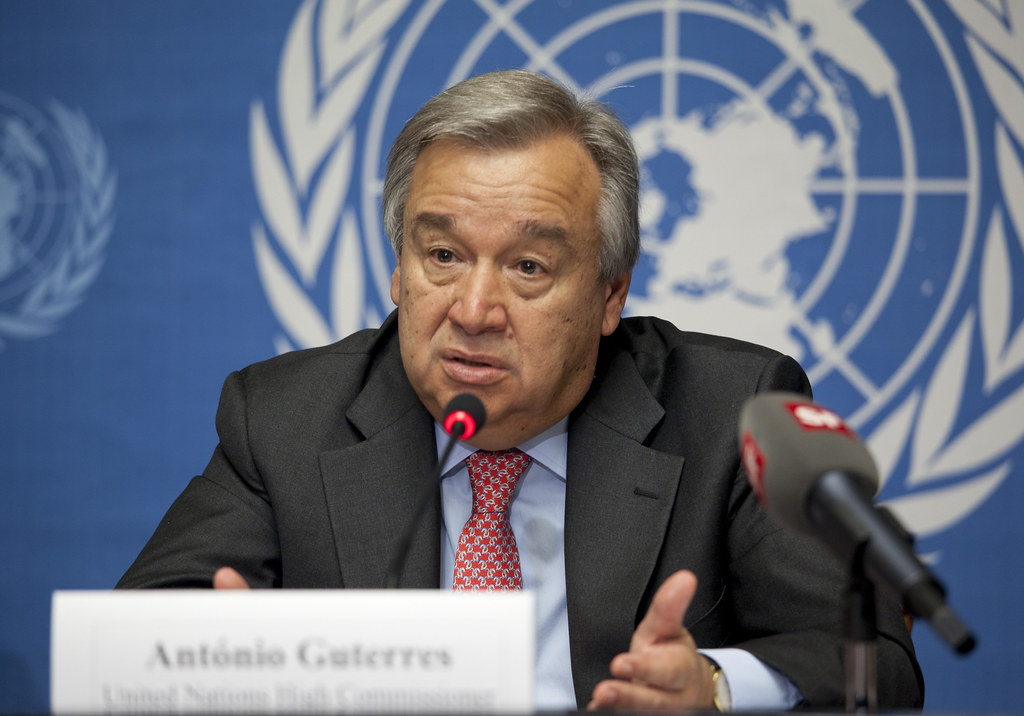To date, the Taliban-led administration has not been recognised by any country since it militarily seized power in 2021.
The United Nations is holding a closed-door international meeting on Afghanistan in Qatar between 1-2 May in a bid to find “durable way forward” for the crisis-stricken country, AFP reported on Wednesday.
The international organisation’s Secretary-General Antonio Guterres will convene the meeting in the Gulf state, his spokesperson Stephane Dujarric confirmed to reporters.
“The purpose of this kind of small group meeting is for us to reinvigorate the international engagement around the common objectives for a durable way forward on the situation in Afghanistan,” Dujarric said, as quoted by AFP.
Dujarric added that officials from the international community aim to “clarify expectations” on several issues in Afghanistan, at the top of which is strict policies towards women and girls in Kabul.
The UN official noted that Guterres “continues to believe that it’s an urgent priority to advance an approach based on pragmatism and principles, combined with strategic patience, and to identify parameters for creative, flexible, principled and constructive engagement.”
However, the UN did not disclose further details on attendees and it remains unclear whether the Taliban-led Afghan government will be in attendance.
Recognition of acting Afghan administration
To date, the Taliban-led administration has not been recognised by any country since it militarily seized power in 2021.
Last year, the UN General Assembly approved a postponement of Kabul’s request to appoint an ambassador at the intergovernmental organisation for the second time.
However, speculations over a possible recognition of the acting Afghan government emerged on Monday after the UN’s Deputy Secretary-General Amina Mohammed hinted towards “baby steps” in recognising the Taliban.
“There are some who believe this can never happen. There are others that say, well, it has to happen,” Mohammed said in a talk at Princeton University, as quoted by AFP.
She added: “The Taliban clearly want recognition… and that’s the leverage we have.”
However, Dujarric said Mohammed “was not in any way implying that anyone else but member states have the authority for recognition” of the Afghan government, noting she spoke on the need for “a coordinated approach regarding Afghanistan.”
“This includes finding common ground on the longer-term vision for the country, and sending a unified message to the de facto authorities on the imperative to ensure women have their rightful place in the Afghan society,” he explained.
A United States official speaking on condition of anonymity told Reuters on the same day that “the intent and purpose of this meeting was never to discuss recognition of the Taliban and any discussion at the meeting about recognition would be unacceptable.”
Qatar’s engagement in Afghanistan
The choice of Qatar as the location for the meeting reflects its position as a platform for dialogue between the international community and the Taliban, especially in the aftermath of the group’s takeover of Kabul.
Qatar has hosted the Taliban’s political office in Doha since 2012 and has served as a key mediator between the group and the former Afghan administration as well as the western wrld.
Most notably, the Gulf state managed to bring the former Afghan government and the Taliban to the table of negotiations in 2020 in an effort to reach a peaceful settlement.
During the same year, Qatar brought the US and the Taliban together following more than a decade of war to produce the Doha Agreement.
Since the takeover, the Gulf state has repeatedly called on the international community to avoid isolating Afghanistan, urging them to prioritise the need to address its humanitarian situation.
In recent years, Doha has doubled down on its calls on the interim Afghan administration to allow Afghan women and girls to pursue education after the Taliban introduced oppressive measures.
In January, Qatar’s foreign minister said Doha has been in contact with the interim government to understand the rationale behind the restrictive policies towards women and girls.
The top diplomat told CNBC at the time that Doha cannot see such policies rationalised from either a religious or cultural perspective, and confirmed his country is currently involved in consultations with other Muslim nations to “deal” with the situation.
“It’s just more and more provoking and making the situation much worse for them and for the Afghan people, we’ve been trying to reach out recently after these decisions take place. We’ve been trying also through other means jointly with other Muslim countries to talk to them and to go together,” Sheikh Mohammed said.
The Qatari official also vowed that Doha will stand with and support the women in Afghanistan.
“We will not exert any effort in order to make sure that we are helpful for them and to make sure that these kinds of decisions are not happening,” Sheikh Mohammed said.







